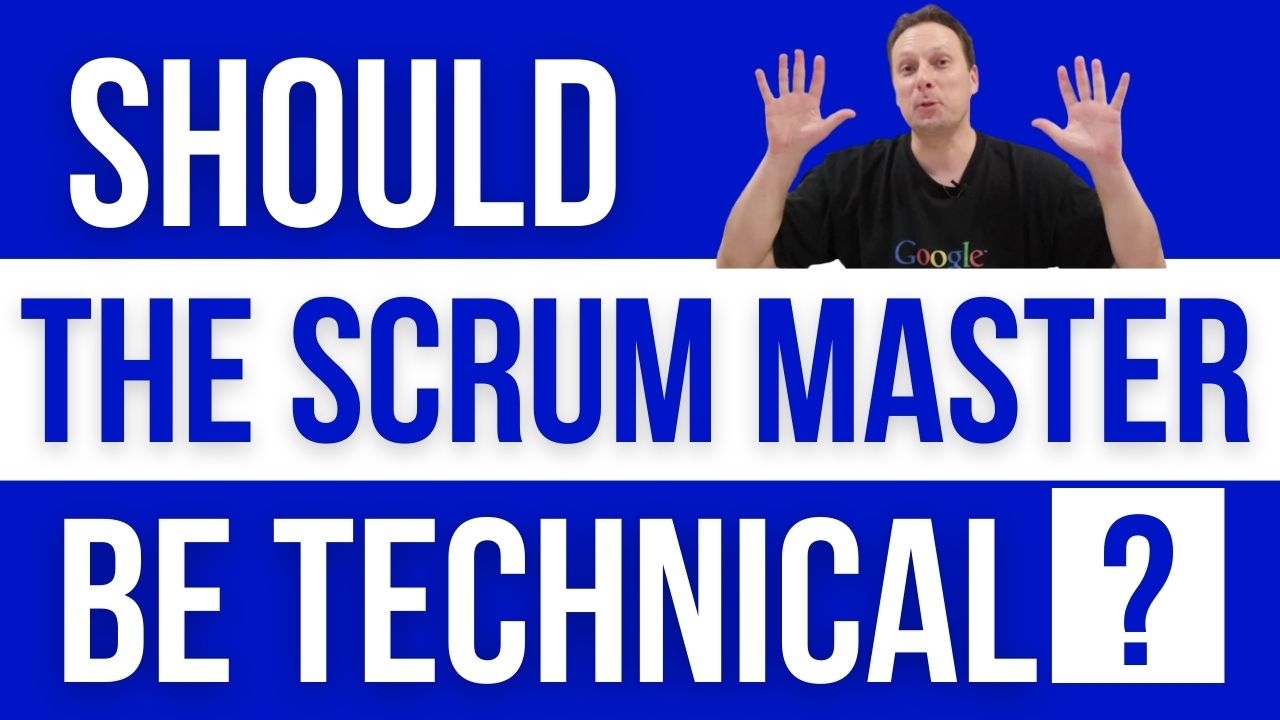Scrum Master Non-Technical
Introduction + Free Giveaway
Are you considering a career as a Scrum Master (SM)?
Do you want to be clear whether Scrum Master, especially in the context of a Scrum Master Non-Technical role, is a non-technical or technical role? Whether you’re just starting to explore the role or have been in the field for some time, the question of whether a Scrum Master needs to be technically savvy might have crossed your mind.
The short answer? No.
The world of Scrum is not exclusively for tech wizards.
In fact, Scrum Masters come from diverse backgrounds, and being technically proficient is not a prerequisite for success in this role.
So, whether you’re from a non-technical field or simply lack deep technical knowledge, you can still excel as a Scrum Master.
In this article, we’ll explore the question of whether a Scrum Master needs technical expertise and delve into the advantages and disadvantages of having a technical or non-technical background in this role.
If you’re interested in learning more about what it takes to be an effective Scrum Master, be sure to check out our podcast episode on this topic for additional insights.
Free Giveaway
As you embark on your journey to becoming a successful Scrum Master, we have not one, but two exhilarating giveaways just for you.
- Are you curious to gauge your current Scrum knowledge? Our Scrum Master Self-Assessment Checklist is your key to unlocking insights into your readiness. Simply shoot us an email at agileandscrummasterclass {{@}} gmail.com, and we’ll rush this valuable PDF document to your inbox in an instant.
- But that’s not all! Ever wondered which Scrum role aligns perfectly with your unique aspirations? Dive into the Scrum Master vs. Product Owner Quiz – it’s fast, it’s fun, and it requires no registration. Click here to embark on this exciting quest and discover your ideal Scrum role.
The Technical Myth
The Scrum Master role is often misunderstood when it comes to technical requirements. Some may wonder if Scrum Masters need to speak the language of developers or possess intricate technical knowledge.
However, according to the Scrum Guide, there is no specific mention of technical expertise as a requirement for Scrum Masters.
A Scrum Master’s primary responsibilities involve facilitating Scrum events, removing impediments, and ensuring the Scrum framework is understood and followed. While technical proficiency can be an asset, it is not a strict necessity. Instead, a strong grasp of Agile values, principles, and mindset is crucial.
Click here for more information on how to fast-track your journey to becoming a Scrum professional.
Scrum Master with a Technical Background
Let’s first explore the advantages and disadvantages of having a Scrum Master with a technical background.
Advantages of a Technical Scrum Master
- Technical Solutions: A Scrum Master with technical knowledge can provide effective solutions and suggestions during technical discussions, contributing to better decision-making within the team.
- Work Allocation: They can collaborate with the Product Owner to allocate work effectively, ensuring that tasks align with each increment and are prioritized appropriately.
- Realistic Task Setting: Technical Scrum Masters can set tasks with a deep understanding of the timeline, motivating the team by offering realistic and achievable goals.
- Improved Communication: Team members find it easier to share their perspectives on technical functions with a Scrum Master who understands their language.
- Faster Business Goals: Effective leadership from a technical Scrum Master can lead to faster achievement of business goals.
Disadvantages of a Technical Scrum Master
- Command and Control: Technical Scrum Masters might inadvertently stifle team decision-making, leading to a “command and control” management style that hinders creativity and self-organization.
- Distraction for Product Owner: The Product Owner may begin to delegate tasks to the Scrum Master, potentially diverting focus from product development.
- Process Interference: Technical Scrum Masters may impose their methods on the team, leading to discord and bias within the team.
- Team Division: Teams may become divided, with some members aligning with the Scrum Master and others against, resulting in collaboration challenges and biased decisions.
- Communication Length: Technical Scrum Masters may dominate discussions, potentially leading to lengthy Scrum events like Daily Standups.
- Limited Roles: Technical Scrum Masters might influence every aspect of development, limiting team members’ autonomy and effectiveness.
Scrum Master with a Non-Technical Background
Now, let’s explore the advantages and disadvantages of having a Scrum Master, from a Scrum Master Non-Technical background.
Advantages of a Scrum Master Non-Technical
- Effective Facilitation: Non-technical Scrum Masters excel at asking simple yet effective questions that stimulate developer thinking, fostering creativity and self-organization.
- Focus on Timelines: They prioritize timelines over technical planning, allowing team members to work autonomously and meet deadlines.
- Mediation Skills: Non-technical Scrum Masters serve as mediators between developers and the Product Owner, promoting effective communication and task completion.
Disadvantages of a Scrum Master Non-Technical
- Acceptance Criteria: A non-technical Scrum Master may accept the Product Owner’s acceptance criteria without questioning their feasibility in certain situations.
- Overlooking Details: They may overlook technical details, potentially resulting in gaps in product development and delivery.
- Lack of Technical Insight: Team members may provide inaccurate information to the Scrum Master, who, lacking technical skills, might accept it without correction.
WATCH: What are the most asymmetrical problems for a new Scrum Master?

Conclusion
While technical knowledge can be an advantage for a Scrum Master, including a Scrum Master Non-Technical, it is by no means a prerequisite for success. Scrum Masters can come from diverse backgrounds, and their effectiveness depends on their ability to facilitate Scrum events, remove impediments, and uphold the Scrum framework.
To deepen your insight into the qualities of a successful Scrum Master, we invite you to explore our Scrum Blog. There, I address the questions and challenges that my students encounter on their Scrum journey. We’ll explore essential skills, and career pathways, and provide valuable insights to help you on your journey, whether you have technical expertise or not.
Don’t forget to claim the two exciting giveaways that await you: the Scrum Master Self-Assessment Checklist in PDF (Simply shoot us an email at agileandscrummasterclass {{@}} gmail.com, and we’ll rush this valuable PDF document to your inbox in an instant) and the Scrum Master vs. Product Owner Quiz.
Remember, the world of Scrum welcomes individuals from various backgrounds, and what truly matters is your dedication to fostering Agile values and principles within your team.
As a personal recommendation, consider starting with a focus on soft skills and gradually building your technical expertise.
You can embark on this learning journey right away with my Free Scrum Course.
Begin your Scrum mastery adventure today, whether you’re pursuing a technical path or embracing the Scrum Master Non-Technical journey!
